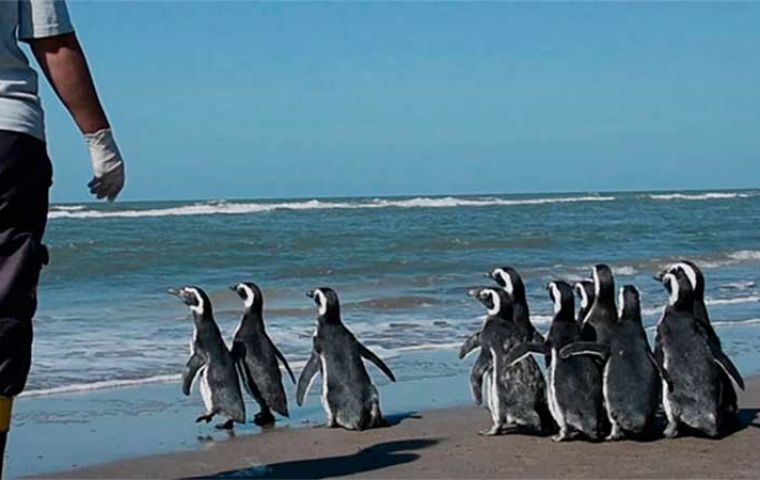MercoPress. South Atlantic News Agency
Rescued Magellanic penguins returned to the sea
 The animals were fitted with a subcutaneous microchip featuring each one's medical record, should any of them appear in another latitude
The animals were fitted with a subcutaneous microchip featuring each one's medical record, should any of them appear in another latitude Argentine environmentalists and scientists brought back to the sea a group of 14 Magellanic penguins that had been rescued from the beaches and treated at the San Clemente-based Mundo Marino Foundation for malnutrition, dehydration, hypothermia, and a high parasitic load.
The specimens of the Spheniscus Magellanicus variant had been assisted between late March and early May on the Buenos Aires province Atlantic coast.
The birds were returned to their natural habitat last week involving high school students from a local school, it was reported. In addition to the Mundo Marino Foundation, also participating in the rescue and first aid works were Fundación Ecológica Pinamar, (in Valeria del Mar and Pinamar), Fundación Rescate Verdemar (in Villa Gesell), Grupo de Rescate de Fauna Silvestre (San Bernardo, Santa Teresita, and Mar del Tuyú), and the Argentine Coast Guard (Prefectura Naval Argentina - in Mar de Ajó).
“These were juvenile animals that are making their first tropic migration and were born in November last year,” Mundo Marino's Sergio Rodríguez Heredia explained through a statement.
Magellanic penguins are to be found in Argentine and Chilean Patagonia alike. After their breeding cycle -between September and March, they molt their plumage and begin their migratory journey up to as far as Rio de Janeiro between late March and early April.
These rescued specimens were all admitted “with a condition commonly known as 'stranded penguin syndrome', that is, underweight, dehydrated, anemic and hypothermic animals with a high degree of parasitism,” Rodríguez Heredia also noted.
“These animals absorb water through fish, so if they do not find food, they become dehydrated and, for some reason, in their migratory journey, they are not finding the food necessary to survive,” he added.
The diet of these penguins is made up of fish such as anchovies, sardines, and hake; mollusks, such as squid, and crustaceans, such as shrimp.
Upon admission to the rescue center, they were stabilized with fluid therapy to reverse the dehydration symptoms. Progressively, they were offered a liquefied fish formula with vitamins and minerals until they could be fed whole fish. Blood and fecal samples were taken, and antibiotics were given to those with infectious conditions.
“They were responding well to the treatment and, after a second blood sample, which showed normal blood parameters, we determined that they were fit to return to the sea,” Mundo Marino's Technical Director Juan Pablo Loureiro also pointed out in the communiqué.




Top Comments
Disclaimer & comment rulesCommenting for this story is now closed.
If you have a Facebook account, become a fan and comment on our Facebook Page!